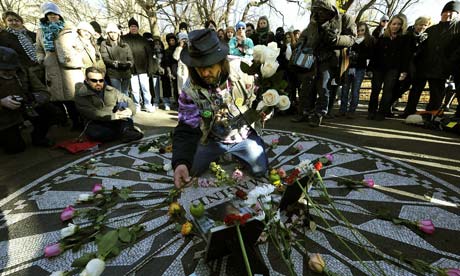John Lennon fans mark anniversary of singer's murder in New York City
Candles lit and flowers laid at Central Park's Strawberry Fields, opposite site of Dakota death 30 years ago

Despite a strong winter wind, the two candles lit by Ayrton "Gary" dos Santos kept on burning as he placed them on the black and white mosaic in Central Park's Strawberry Fields that pays tribute to the memory of John Lennon.
Dos Santos has laid fresh flowers here each day for 17 years and is known as the Mayor of Strawberry Fields. But today's tribute was not a lonely one. On the 30th anniversary of the former Beatle's murder, he was watched by a crowd of onlookers and journalists. "It is a sad day," he said. "It will always be a sad day. I will keep doing this for John until the day I die."The memorial, which bears the word "Imagine", taken from Lennon's most famous song, was surrounded by a throng of people braving the freezing cold of a blustery but sunny morning.
Most stood and watched Dos Santos. Some laid down photos of Lennon while others placed apples and even a slice of cake.
Rob Wilson, 19, a guitar-wielding New Jersey student, sat and strummed Let It Be. When he switched to Imagine, a few spectators sang along. Wilson said he was skipping classes to play and meditate all day on Lennon.
"John is the Jesus of music," he said. "He came here to save us. He still is."
Strawberry Fields is just 50m from the Dakota apartments where Lennon and Yoko Ono lived. Lennon arrived at the building for the last time in 1980, after a day at a recording studio. He planned to say goodnight to his son Sean, aged five. Instead Mark Chapman was waiting and shot him dead.
The death shocked the world, deifying Lennon as a political symbol of radical politics and ensuring that, unlike the other Beatles, he would never grow old.
Thus he still inspires people today, even those born years after he died.
One such fan is Daniel Garza, 24. The chef had travelled from San Antonio, Texas, just to pay tribute to Lennon.
He said he felt both sad and happy and that Lennon's legacy of music and striving for peace lived on.
"The mourning period is over. Thirty years is plenty of time. Now it is just remembrance. The music will live forever and so will his ideas," said Garza, wearing a Lennon T-shirt.
The mood at Strawberry Fields was a mix of sombreness and happiness.
Many tourists, mingling with mourners and journalists, took photographs. Others stood silently, clasping their hands together or laying flowers and saying brief prayers. One woman knelt on the ground and sang along to Wilson's music. Another man stood quietly holding a sign stating: CIA killed Lennon.
One enterprising street stallholder set up shop nearby, hawking pictures of Lennon and Liverpool FC scarves. That spirit of capitalist enterprise – which Lennon himself is said to have been sceptical about – was evident in much of the media hype in the US this week.
TV channels and publishing houses rushed to produce books and documentaries on Lennon and his death.
They ranged from CNN special programmes to a broadcast of a final radio interview that Lennon and Ono gave just hours before his death. Elsewhere, photography exhibits opened and new books hit the shelves.
Much of the media coverage was hagiographical, but some showed less respect. In a rather unkind column headlined: Imagine there was no shooting – grumpy John Lennon turns 70, Bloomberg culture writer Mark Beech described an alternate reality in which Lennon was still alive and sang at Barack Obama's inauguration. "My guess is that he would be a cranky 70-year-old, a not-so-English eccentric, ridiculed by many, still venerated by fans," Beech wrote.
Other newspapers ran extensive articles asking readers to remember where they had been when they heard Lennon was shot.
But perhaps the most poignant voice to emerge from the flood of coverage on Lennon's death was that of the singer himself.
To mark the anniversary, Rolling Stone released the full text of Lennon's final interview with the magazine. In it, he lambasted the critics of his music and lamented the way fame worked.
"It's like idol worship. They only like people when they're on their way up. I cannot be on the way up again," he said before adding: "What they want is dead heroes, like Sid Vicious and James Dean. I'm not interested in being a dead hero. So forget 'em."
Sadly, the choice over becoming a dead hero was not Lennon's to make
